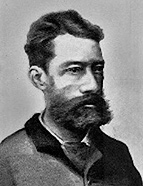

For someone with enormous intellectual curiosity and no financial problems, Martins Sarmento, for reasons of health or temperament, was not particularly fond of travelling, as his main biographer notes. His only trips outside Portugal consisted of two visits to Galicia, a region quite close to the border, never going beyond the Vigo estuary. The eminent German epigraphist Emílio Hübner, whom he received in a particularly friendly manner at his home in Guimarães, in , invited him to visit Germany. Like all educated men of his time, Sarmento knew the classical languages, particularly Latin, which was essential in the academic education of his time, having studied at the Colégio da Lapa. Naturally, he also knew the main foreign languages of Europe, above all French, the language of culture at the time. However, Sarmento rarely demonstrated his knowledge explicitly, as his circle of foreign correspondents was quite limited compared to other figures of his time. The main exception was Hübner, who wrote to him in French, but the German epigraphist, who understood Portuguese well, expressly asked him to write to him in his own language. As for other languages, Sarmento, a compulsive buyer of books on subjects that interested him, acquired an important bibliography in several languages (Spanish, English, Italian, German), demonstrating at least a passive knowledge of them. This is why the words that Hübner addressed to him in a letter are so pertinent: “ vous êtes un debateur de premier rang et j’admire la multitude de livres en toutes les langues que vous avez lus ” (Cardozo, M., Correspondência …, 1947, p. 201).
Sarmento did not pursue any profession, nor did he join any political institutions or, in fact, any organised movement. However, as a perceptive and free-thinking man, he expressed his political opinions in his work in a highly critical manner, with a markedly liberal tone, denouncing the regime’s mistakes, fighting injustice and promoting popular education. In this way, he was involved in a number of initiatives that were, in a way, part of his conception of what his role as a committed man and citizen should be. One of his first and best-known interventions was in the “case of Judge Seco”, a minor episode in the history of Guimarães that had some repercussions at national level. In 1868, Judge Francisco Henriques de Sousa Seco was appointed to the district, whose arrogant attitudes, which even affected the Mayor, sparked a revolt among the most distinguished local figures. Martins Sarmento led those who complained about the magistrate’s arbitrariness and expressed his position in a local publication, specifically edited to contest him, “Justiça de Guimarães” (Justice of Guimarães) (1872). Public pressure eventually had its effect and the judge was transferred, which gave rise to widespread celebrations. His commitment to promoting the common good, particularly that of the most vulnerable, was evident in the establishment of the short-lived Farmers’ Association, which Alberto Sampaio defines as “a kind of rural mutual aid society”. His social conscience (political, at least in its etymological sense) led him in particular to establish, while still alive, the Martins Sarmento Society, to which he (and his wife) left a large part of his estate, a legacy that gave stature to an institution that is still notable today for its cultural promotion and dissemination, particularly in the historical and archaeological fields. Therefore, Martins Sarmento, deliberately distancing himself from political activity in the strict sense, even nurturing some contempt for it, demonstrated a high level of civic awareness, which is, of course, another form of political participation.
This work is financed by national funds through FCT - Foundation for Science and Technology, I.P, in the scope of the projects UIDB/04311/2020 and UIDP/04311/2020.
